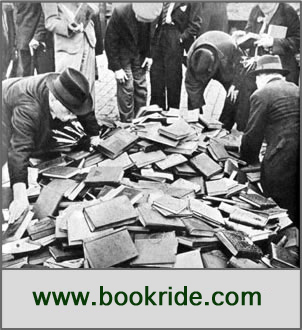
Walter Reynolds. YOUNG ENGLAND. Gollancz, London 1935
Current Selling Prices
$160-$250 / £80-£125
PLAY
I was reminded of this appalling play recently when hearing Edwina Currie review the musical 'Kismet' in London as 'dire,dire,dire...' Without having seen it I am sure she is right because as far as I am concerned all musicals are dire. The medium is the message. Martin Cropper, a brilliant and acerbic critic at 'The Times' got the elbow about 20 years for voicing similar opinions. Edwina said that the revival of Kismet was so lousy it might attract audiences in the way that the fictional 'Springtime for Hitler' did. There is a real life precursor--the unforgettable 1934 hit 'Young England.'
'Young England' is a now uncommon book especially in a jacket and of interest to theatre collectors and connoisseurs of the odd and the zany. Reynolds appears to have been a sort of Amanda Ros of the theatre--so very bad that he is good. Our last copy was described thus:
'8vo. pp 288. Frontis portrait, 5 plates. A play in two periods. This play had an unlikely success in the 1930s rather similar to the fictitious 'Springtime for Hitler.' It was so appallingly bad that audiences came along in their droves for over 300 nights to shout amusing remarks and generally revel in its ghastliness. The frontis portrait of the Reverend Walter Reynolds shows a stern Scottish type who apparently would walk up and down the aisles of the theatre during performances telling people to be quiet. Quite scarce.'
 The critics voted it the worst show that had opened in London in 20 years: nobody gave it three nights. It ran, to packed houses, for nearly a year. Over a quarter of a million people saw it. Wikipedia has an entry on it and the Time magazine archives have this article from December 1939 :
The critics voted it the worst show that had opened in London in 20 years: nobody gave it three nights. It ran, to packed houses, for nearly a year. Over a quarter of a million people saw it. Wikipedia has an entry on it and the Time magazine archives have this article from December 1939 : '...London's bright boys just had to see what the worst show in 20 years looked like. They screamed with laughter at its superpatriotic goings-on, involving gallant officers, dastardly villains, prostitutes, Boy Scouts, Girl Guides, taints of illegitimacy, stolen papers, stolen cash, the Union Jack. They went back for more, and their friends went with them. .Soon it became quite as chic to go (preferably halfcocked) to Young England as to the opera. At first the audience merely ad-libbed, then (as they came to know the play virtually by heart) they started beating the actors to their lines. The famed British reserve took its worst pummeling in centuries, and Young England became a rough-&-tumble free-for-all.
Shortly after World War II began, it was decided to revive the play. There were some fears that it might have ad-libbed its usefulness, that jesting at patriotism might not go down in wartime. The fears were groundless. With tension in the air, people have been gladder than ever to relax, and with soldiers in the audience, the wisecracks are even rawer than they used to be.
¶ One set shows a Salvation Army "citadel" with doors marked MEN and WOMEN. Every time an actor starts for one, the crowd shouts: "Wrong door, wrong door."
¶ When Boy Scouts or Girl Guides are assigned to "water detail," voices pipe up: "Stay out of those bushes"; "Be careful of the side of the barn."
¶ One night, when the hero was proved not to be illegitimate, someone yelled: "Consider yourself unbawstardized."
¶ The actors (who otherwise play their roles straight) have made a game of altering their lines if the crowd beats them to the draw. Thus the villain, when led away by the police, pauses to say "Foiled!" He was almost licked one night when the crowd shouted not only "Foiled!" but "Baffled!" "Beaten!" "Frustrated!" "Outwitted!" "Trapped!" "Flummoxed!" He waited until the wits were through, then hissed: "Stymied!"
Walter Reynolds, Young England's 88-year-old author, still takes his dead-serious play seriously. He went to the opening of the revival, a sad, reedy figure in a great black cape, doddered up the stairs to his box holding on to both handrails, sat tense through the uproar, at the end bowed to the audience, thanked them. Asked in a BBC interview whether he wasn't angry at the way audiences treated Young England, he answered: "No. They're a little noisy . . . but they pay as much as 10 and 6 for seats, so they must like it."
I had an aunt who saw the play and still talked about it into her nineties, she recalled people throwing things and a whole lot of shouted audience participation- 'rather like a pantomine.' One old actor recalled being hit by coins ('quite painful.') One wonders if this could ever happen again in the West End; possibly our current theatre goers are not up for a laugh in the same way as the young things of the 1930s. As the 'Time' reporter writes, many of the audience went to the show 'halfcocked' -probably cocktails, given the era.
VALUE? Not vast. Above prices are for nice copies in jacket, for some reason most copies I have seen have been mediocre. You can get more for a good Stoppard first edition - but a nice copy of this play in the jacket, signed by the great man should get well into three figures.


1 comment:
Vastly amusing--Cecil Beaton had a very bad play performed (Marlborough?) and it wasn't bad enough to be any good--real failiure there (and such a nice man)
Post a Comment